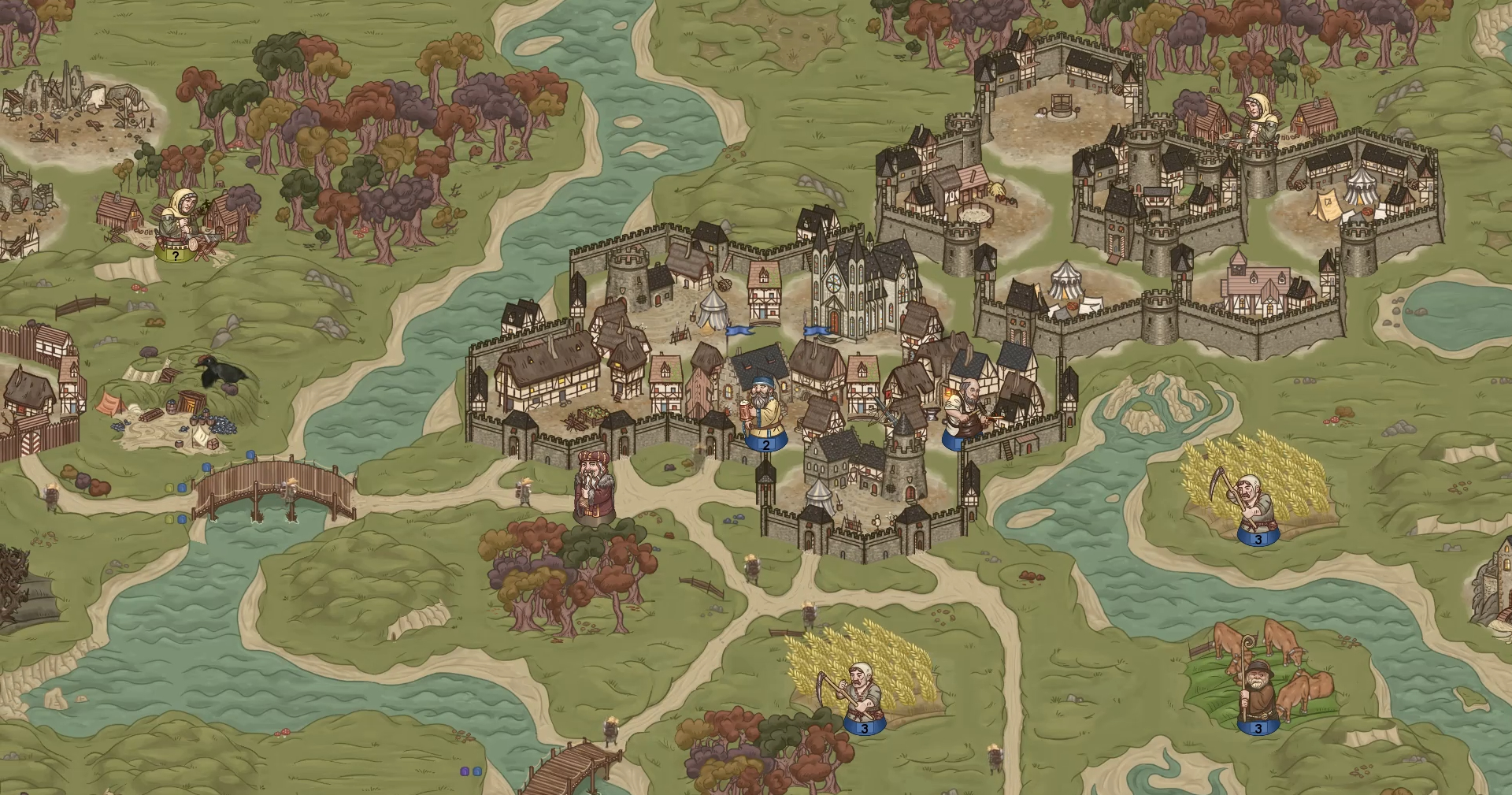Rising Lords Review (PC) – More Landowner Than Noble
If there is one thing the indie space excels at, it’s turning unique ideas into a playable game. Rising Lords is a turn-based medieval strategy game that simply wouldn’t exist in the upper echelons of the industry. An interesting blend of overworld management and grid-based tactical action, it has the air of a king-in-waiting.
Despite its charming visuals and creative spin on the turn-based strategy genre, it never truly achieves lordly title its promise suggests. Raise your banners and gather the troops, a clash of swords awaits and this land isn’t going to unify itself.
Rise To The Occasion
Rising Lords was announced in the pre-Covid times, about five years ago. That’s a long old time, so to see this passion project finally come to fruition is fantastic. The game is split into a handful of modes: story campaign, scenarios (skirmish), challenge and multiplayer. Seems best to start with the story, every good tale needs an epic beginning, right?
Well, Rising Lords starts off as is fairly expected for the medieval setting. You play a young lord, thrust into the demanding and expectant role of head of your house. After a brief tutorial where your family’s leadership is upended, its time for you to take on the responsibility of commander-in-chief. There’s little in the story chops that really set the narrative apart, but its competent if not spectacular.
While I love a medieval atmosphere and story, the game struggles to really land its narrative hooks. Much of it is delivered via text dumps and overwritten sequences. I found it difficult to care much for the characters when there’s six dozen of them being referenced on every page. It reads a bit like A Song of Ice and Fire book, but without the compelling world building or interesting storylines.
The pre-release version I was able to play provided two chapters of the story, so there’s more potentially to come. However, it’s likely to be a continuation of what’s been shown, rather than a revolution. Based on what I was able to play, I can’t imagine this would be the primary reason to approach Rising Lords, unfortunately. While it isn’t bad to follow, it’s lacking the heart of an engaging story.
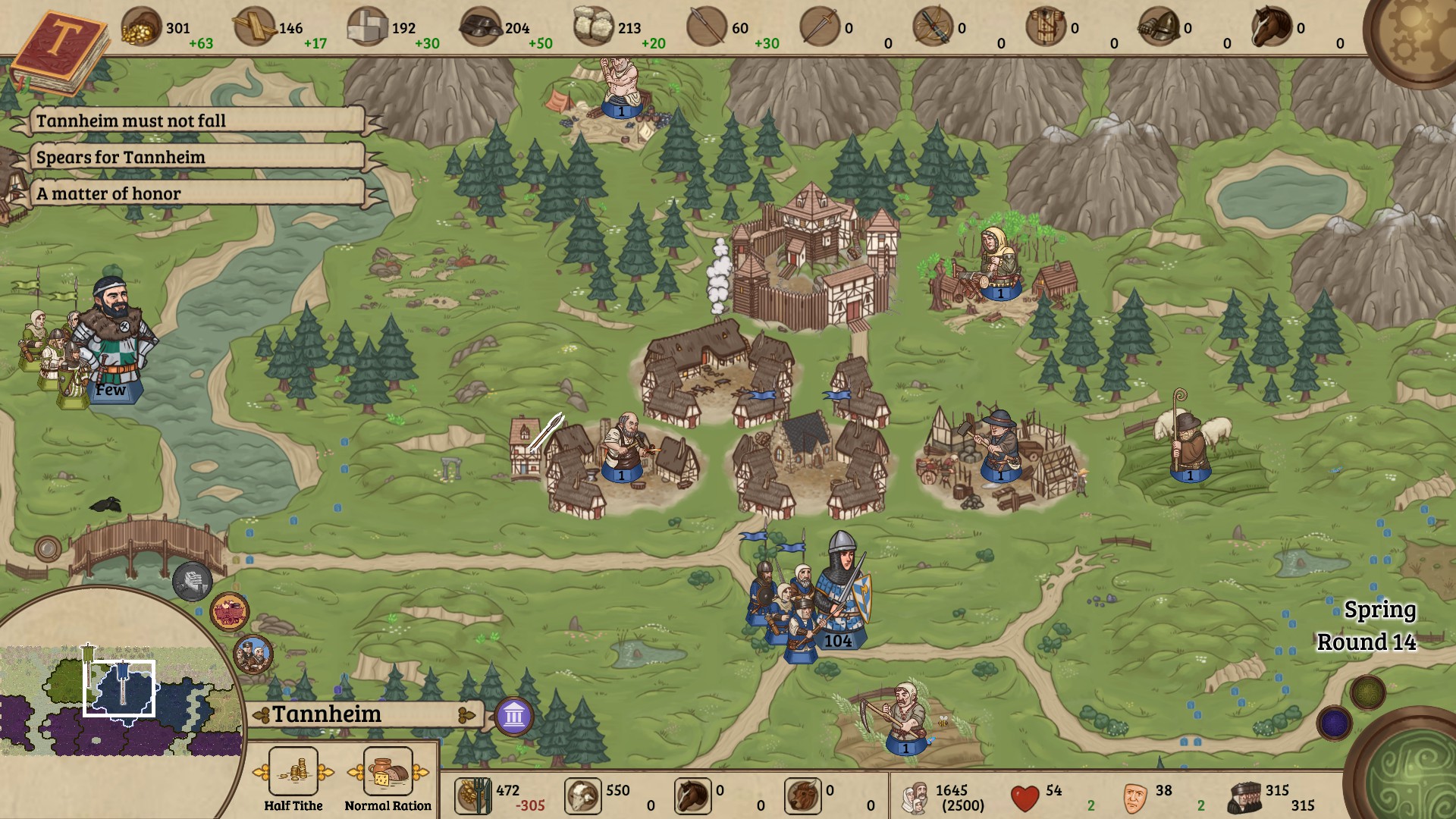
Lord of the Kings
Enough with the lollygagging, what kind of steel is Rising Lords bringing to the fray, I here you ask. Well, two kinds, for the most part. The overworld map overlay is where you’ll spending the majority of your time. Managing peasants, collecting resources, smithing weapons and conquering settlements to expand your fledgling empire.
Territories are made of grids, each of which can have buildings constructed on top of them. Peasants need to be allocated to allotments to produce resources, which occurs automatically every turn. Each turn brings a new season, creating dynamic events. Winter will turn away parts of your population, limiting your worker count, for example.
As you begin a story chapter or a scenario, you’ll battle the elements to juggle resourcing food, weapons and popularity. Once you become established, it does become easier to settle into a secure footing as you glance across the land for more dominion. After a few turns however, you’ll suddenly be smacked with the realisation that the strategy is all a bit lightweight.
Dynamic events do little other than increase or decrease incomes. Peasants automatically produce resources with no input other than allocation, and provided you keep your population up, it’s actually very easy to keep things chugging along. The only barriers I came across were when the story arbitrarily made things arduous, usually by enforcing overly strict turn limits or stripping away armies between chapters (but not replenishing the resources you spent to raise them).
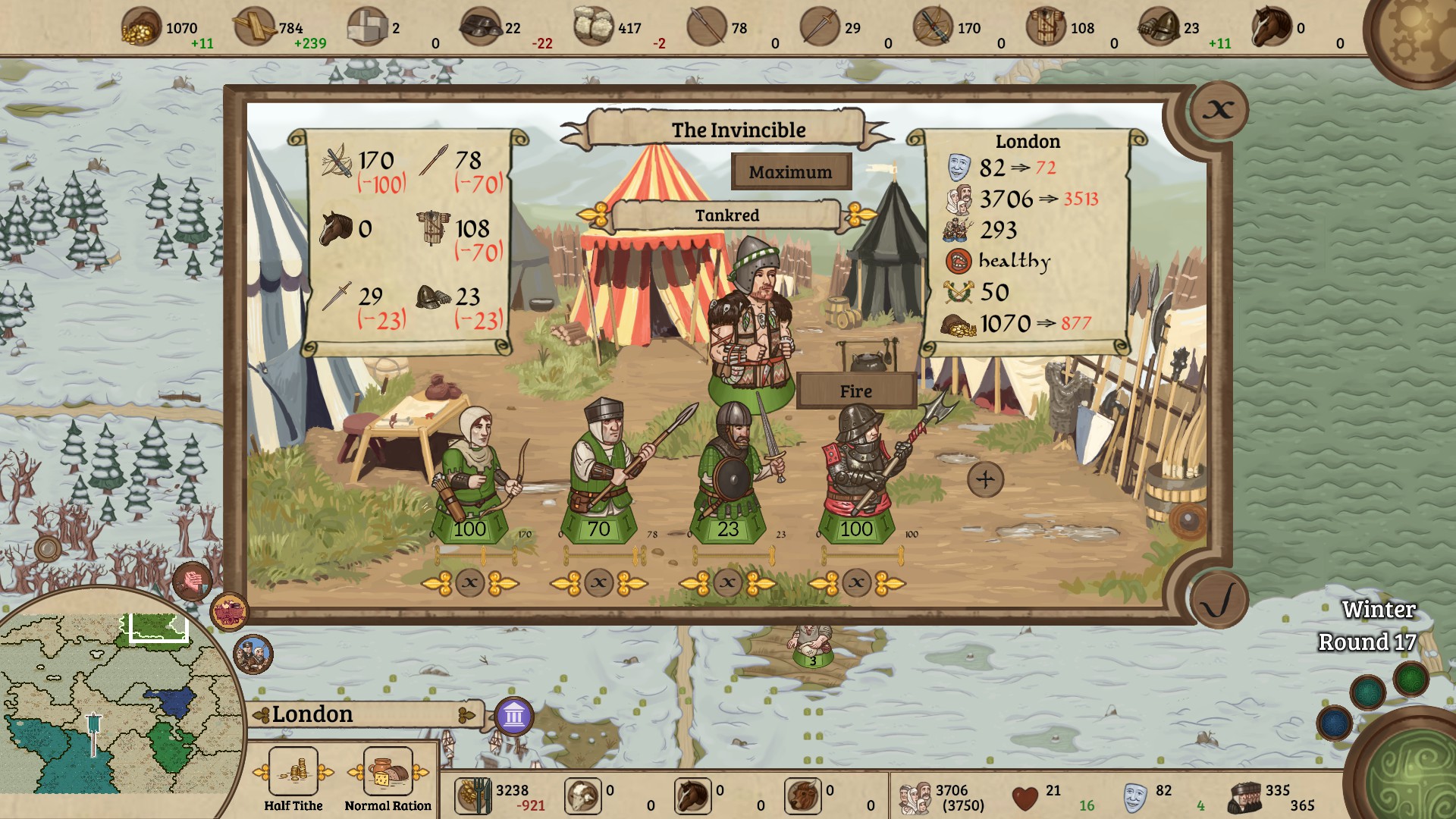
Settle It, Feudal Style
In fact, this was probably my biggest sword to the gullet with Rising Lords. The first attempt at almost anything feels intentionally designed to make you fail. The ridiculous turn limits, the unfair “surprises” it throws at you and the balancing between chapters is as forgiving as Henry VIII. Problem is, once you know what’s coming, it’s far easier to actually smash through it. Which isn’t skill, it’s trial and error.
Scenarios and challenge maps remove that element entirely. As you’re free to plug away at your own pace, things feel less restrictive. However, that brings the problem of the shallow nature of the management gameplay having to be stretched far beyond its means. There’s a balance to be struck, and in the sweet spot, it’ll be as defining as a Hastings arrow meeting an eye. But it just hasn’t been struck yet.
Turn-based combat follows a similar series of peaks and troughs. You deploy units, the enemy deploys theirs. There’s a basic rock-paper-scissors system in terms of what units are effective against others. Then you need to factor in terrain type, morale, structures, pathing and using cards for various buffs and debuffs. On the surface, there’s a layer of tactical decision-making which is engrossing.
After a few battles however, it really boiled down to who has more spearmen and knights. If you’re vastly outnumbered, there’s very little you can do to turn the tide or even whittle down numbers. Similarly, if you’re looming over your opponent with hundreds more units, you’re guaranteed massive damage output if you play sensibly. There’s a feeling of dynamism and improvisation that’s missing in Rising Lords, and I just felt like the game would have been so much more satisfying had this been present.
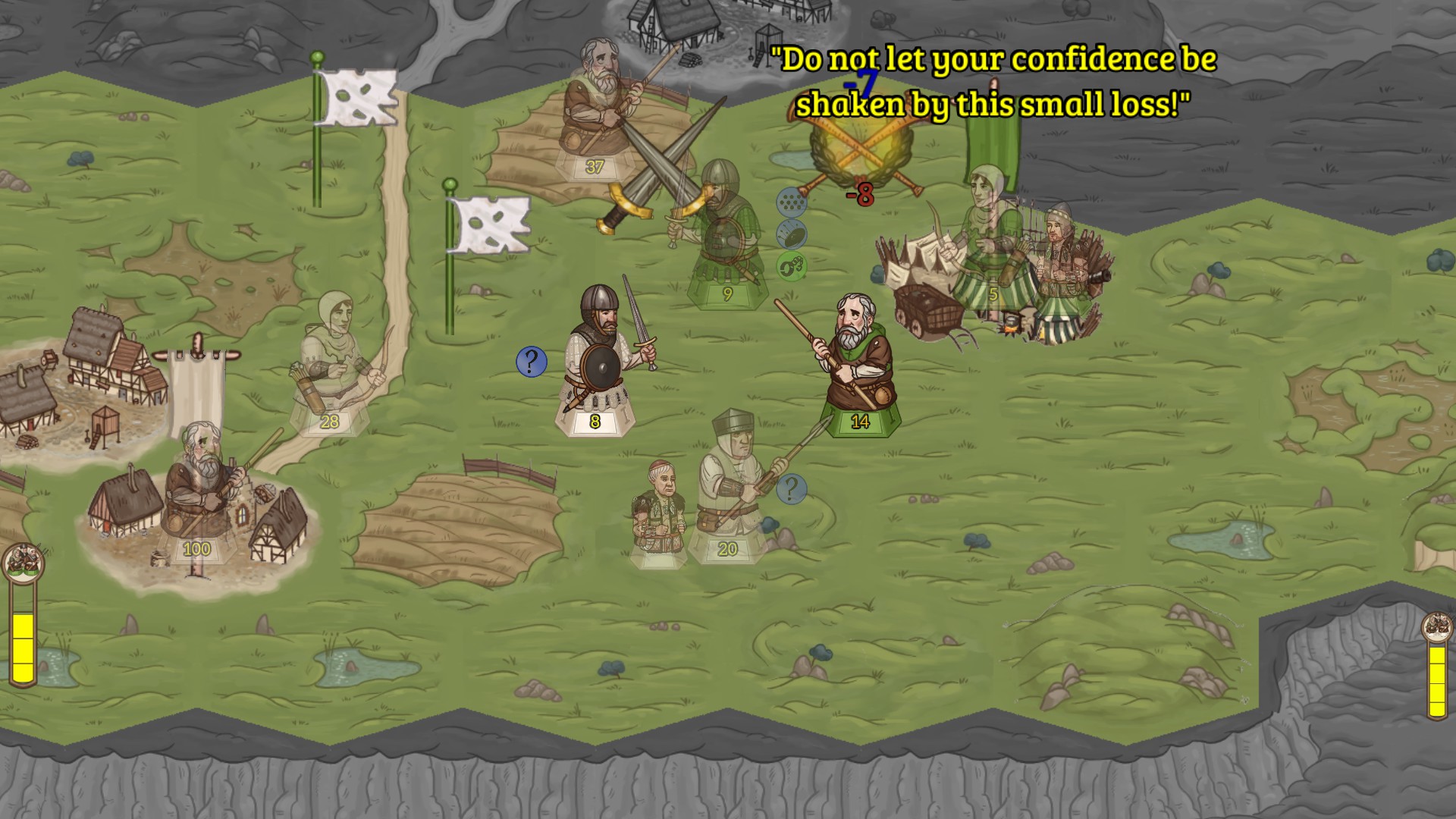
Behold, Thy Lord
I think it’s worth stating at this point, that I actually did like Rising Lords. The onboarding and tutorialisation could do with some real fleshing out to make the initial experience less frustrating, for sure. But, once I got my head around things (and usually got spanked the first 2-3 attempts), it started to click a bit, and it was fun. Conquering towns and expanding your influence is never not fun.
It helps that the art style for the game is distinctive and quirky. It looks and animates like you’re a playing a board game, and I dig it a lot. Your units are represented by miniatures and they flowingly animate whatever roles you’ve assigned them. Rising Lords has a hand-drawn aesthetic that’s just pleasing to spend time with, and it props up some of the other elements that aren’t quite at the same level.
Plus, lighting up your opponent’s base in a fiery blaze of glory is both mechanically and visually wonderful. By the time I’m done, it’ll be like King’s Landing once Daenarys was through with it. As I mentioned at the start, it’s rare to get such a compelling style in the AAA space, and Rising Lords is a great example of a noteworthy style making up for not having a spiraling budget.
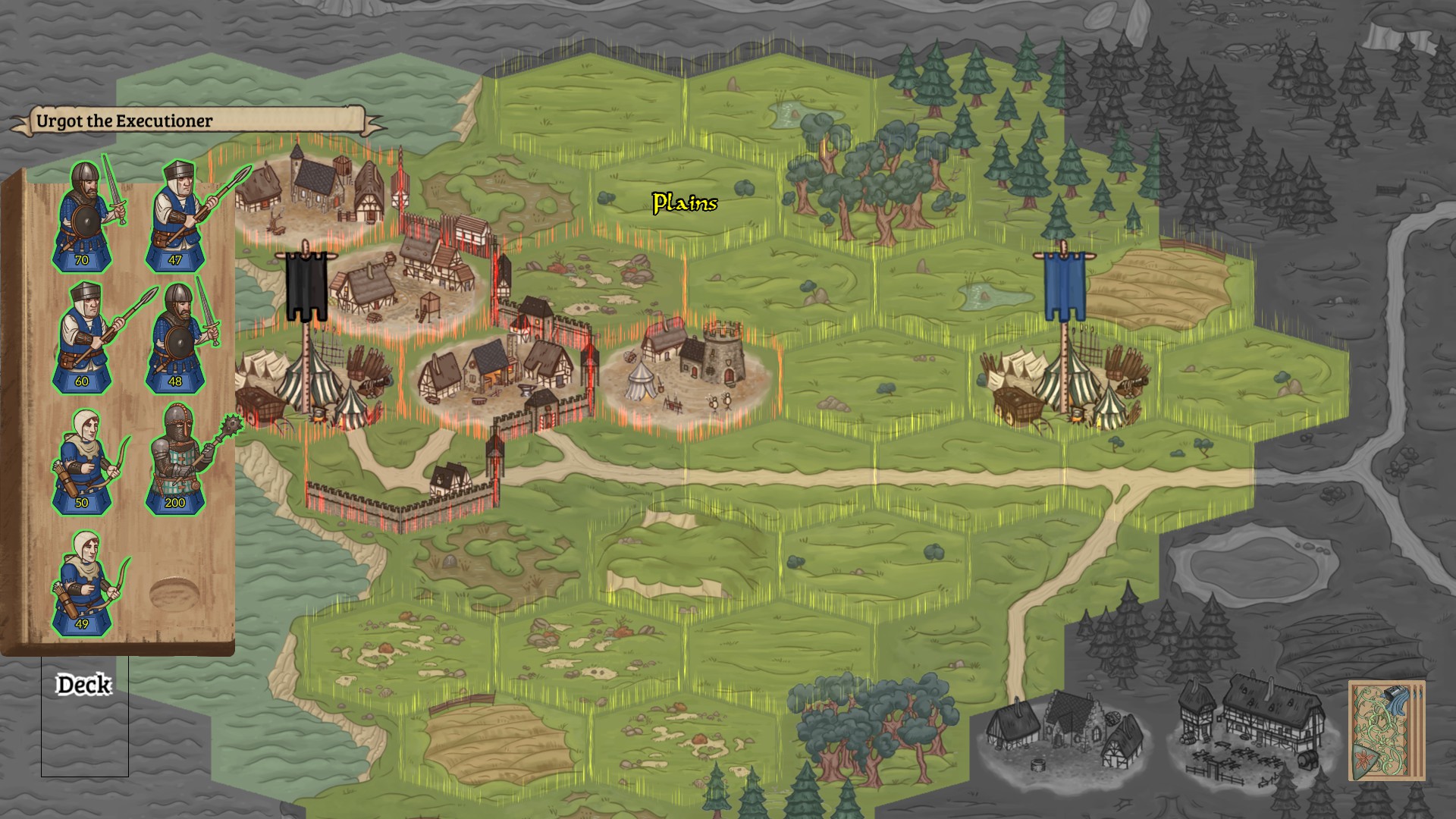
Rising Above Your Station
It’s abundantly clear how much time and love has been invested into Rising Lords. There are parts of it I really, really do like. The management and turn-based gameplay have potential, while the overall style of the package is pretty wonderful. However, it’s rather unwelcoming onboarding, relatively shallow systems and bloated storytelling prevent it reaching the status of a lord. Rather a denizen.
I will state as well, that the offering of modes at this point is also pretty impressive. Offline and online options are fully functional and the story is going to be expanded upon post-release, which bodes well for future support. If those reinforcements can flesh out some of the areas where Rising Lords’ battlelines are thinnest, there could be hope for it yet.
As of right now, it felt to me like a great concept with competent execution that’s lacking in flair and depth. There’s a brilliant foundation that’s been laid out, but your long-term engagement will depend on how well you click with the core systems. Sadly, I don’t think everyone will stick around long enough past the frustrating opening couple of hours to see this young knight restore their house to glory.
Attempting to punch above its serfdom beginnings, Rising Lords serves up a competent yet disappointingly hollow strategy experience. The tutorialisation will ward off many potential banners and despite a charming board game aesthetic, it struggles to consistently demonstrate its knightly qualities. With some time and reinforcements, there’s hope this young lord can achieve their lordly status, but it’s not quite yet.

Rising Lords is available January 18th on Xbox Series S|X, Xbox One, Nintendo Switch and PC.
Developer: Argonwood
Publisher: Deck 13
Disclaimer: In order to complete this review, we were provided with a promotional copy from the publisher.
For our full review policy, please go here. If you enjoyed this article or any more of our content, please consider our Patreon
Make sure to follow Finger Guns on our social channels. Twitter, Facebook, Twitch, Spotify or Apple Podcasts – to keep up to date on our news, reviews and features
